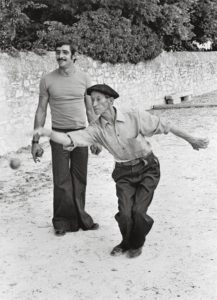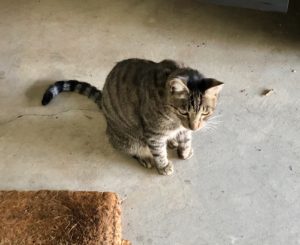I always maintained that we have hidden talents in our midst. Here is an excerpt of a piece written in 1993 by our own “père Noel”. Alain

Here I am again at the House of Toast. I close my eyes for only a second; how did a whole year go by? It seems nothing has changed. I am at the same ancient chrome and chipped Formica table with the same dismal yellow and pink tablecloth. The thick white cups are stacked the same way. The black vinyl chairs, greasy walls, and gummy floor are the same. I am sitting with the same people, but I’m happy to be with them because we are like an extended family.
My suit and tie are also the same. It’s a good suit and expensive tie, but they, with everything else, define the sameness that we all share here. It’s just a few days before Christmas, the time of year when I like to think that I’m doing some good in this world, but wonder if I am.
I have always loved Christmas, and even as an aging House of Toast schlepper, I invariably look forward to the season. Every year I hope and believe that each new Christmas will be better than the last. I hold on to this belief, although evidence to the contrary occasionally finds me in John’s Grill, drinking Christmas cheer rather than spreading it.
As a kid, I believed that Santa Claus existed through the fifth grade. My aunt and uncle, who had raised my twin sister and me, tried to gently explain that they purchased our gifts, but I refused to believe it. Most of the other kids in my class either made fun of me or tried to convince me of Santa’s non-existence.
“Ralph, there ain’t no Santa Claus” my boyhood chum Louie Farina told me.
“If not, how come I get what I asked for in my letter? I replied.
“Because your aunt reads your letter and buys you the stuff you asked for”, advised Louie.
“Maybe that’s true for you Louie, but I mailed the letter to Santa myself. I put a stamp and my return address on it, and send it to the North Pole. The letter never comes back. Nobody’s letter to Santa comes back, and do you know why not?
“No” he replied.
“Because they really go to Santa. They have to be delivered or returned. That’s the law. Anybody who messes with the mail is gonna pick up a federal beef, and wind up doing time in Leavenworth.”
“Yeah, okay,” said a doubting Louie, as he ran off to play with someone else. I guess my insistence on a literal Santa Claus, and my version of Mafia logic was just too much for him.
I continued this conviction into the sixth grade, but that year I inadvertently found the gift I had written Santa for under the sideboard in the dining room. At that moment I surrendered my tenacious hold on Santa Claus. I now suspect that my aunt had left the gift in a location where I was sure to find it.
Noel D. Marcovecchio
What do you think? I would like to hear from you. To leave a viewpoint click on the Leave a reply link located under the media icons. Thank you.

 Dédé always dreamed of seeing his name on the
Dédé always dreamed of seeing his name on the  A cat called Calvin has been wandering in our neighborhood. He is extremely friendly and runs to our front door whenever he hears a car coming. He then meows rather loudly and seems to be asking for food.
A cat called Calvin has been wandering in our neighborhood. He is extremely friendly and runs to our front door whenever he hears a car coming. He then meows rather loudly and seems to be asking for food.